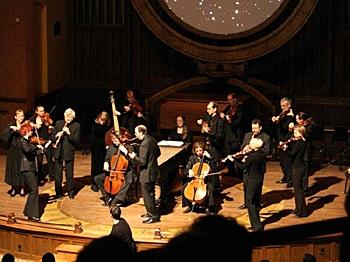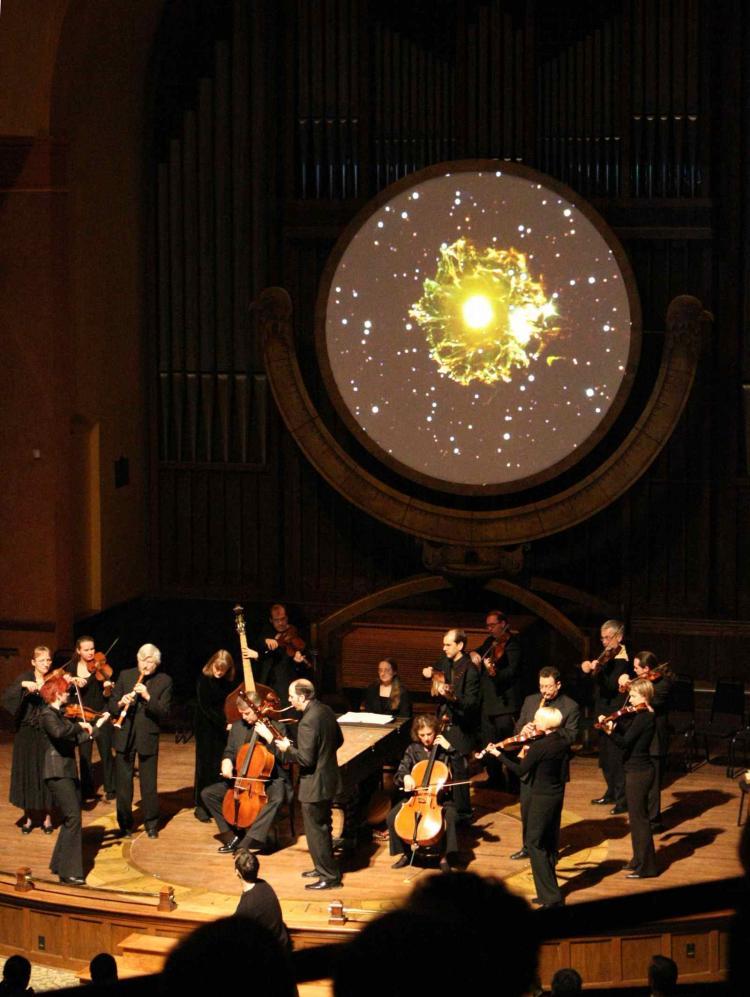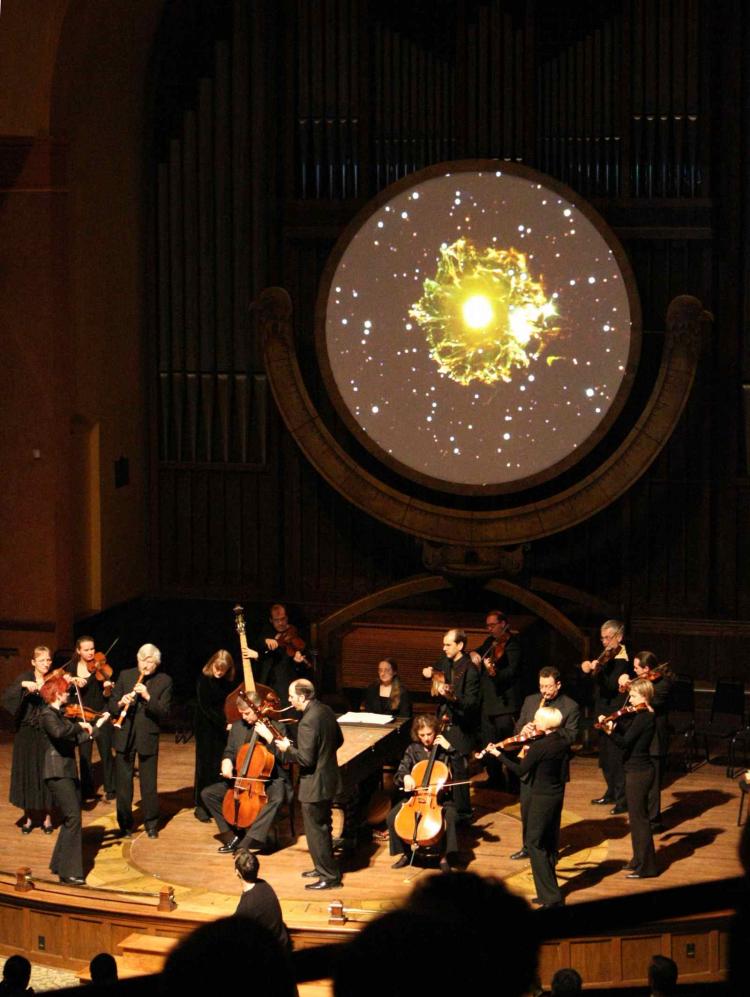OTTAWA—If music can uplift the human spirit, then Friday’s concert at Dominion-Chalmers United Church could take one to the stratosphere as the Tafelmusik Baroque Orchestra commemorated the International Year of Astronomy with Galileo Project: Music of the Spheres.
In the last off-season presentation of the Ottawa Chamber Music Society, the ensemble of 17 musicians and a narrator presented a show that bordered on musical theater as, unencumbered by music stands, the players rotated positions on the stage.
The musicians literally orbited the stationary harpsichord and cellos much like planets circle the sun. Sometimes they walked into the aisles to play—even going up to the balcony. To do this the players had to memorize each note of every score they played— unconventional and no small feat to say the least.
Essential to the performance was a 12-foot high round screen on which a collection of images by Canadian astronomical photographer Alan Dyer were projected: scenes from space, colourful nebulae, the birth of a star, lunar eclipses, images of earth from space, and streams of stars.
Members of the Royal Astronomical Society of Canada (Ottawa Centre) had set up a telescope outside the church for viewing the night sky and Saturn before the show. Their presence lent an unexpected dimension to the concert and was a hit with the younger members of the audience.
Back inside, the story of Galileo, himself a lutenist as well as a scientist, was told by narrator Shaun Smith. According to the program notes, the project “uses music, words and images to explore the artistic, cultural and scientific world in which 17th- and 18th-century astronomers lived and did their work.”
Smith, an actor, told the audience that 2009 coincides with the 400th anniversary of Galileo using the astronomical telescope to discern that the planets revolved around the sun. Galileo paid dearly for stating that the earth was not the centre of the universe, as he died under house arrest after being forced to recant his beliefs.
The narration was interspersed with the hand-picked music of the Baroque composers of the times, such as Overture, from the opera Phaeton, and Air for the Followers of Saturn, by Jean-Baptiste Lully, court composer for Louis XIV. Also played were selections from Monteverdi’s opera Orfeo, and three planet-themed pieces of composer Jean-Phillipe Rameau: Entrance of Jupiter, Entrance of Venus, and Entrance of Mercury.
Members of Tafelmusik play period instruments in the Baroque style and the group used a Bach orchestra setup of harpsichord, strings, two oboes, and a bassoon. The musicianship and playing were superb. The performance seemed to have a downright rhapsodic effect on the audience, with many beaming faces in evidence after the show.
Tafelmusik supplies educational materials about this concert that can be used for either science classes or musicology. See www.tafelmusik.org/education/teacher study.htm. To learn more about the International Year of Astronomy go to www.astronomy2009.com.
In the last off-season presentation of the Ottawa Chamber Music Society, the ensemble of 17 musicians and a narrator presented a show that bordered on musical theater as, unencumbered by music stands, the players rotated positions on the stage.
The musicians literally orbited the stationary harpsichord and cellos much like planets circle the sun. Sometimes they walked into the aisles to play—even going up to the balcony. To do this the players had to memorize each note of every score they played— unconventional and no small feat to say the least.
Essential to the performance was a 12-foot high round screen on which a collection of images by Canadian astronomical photographer Alan Dyer were projected: scenes from space, colourful nebulae, the birth of a star, lunar eclipses, images of earth from space, and streams of stars.
Members of the Royal Astronomical Society of Canada (Ottawa Centre) had set up a telescope outside the church for viewing the night sky and Saturn before the show. Their presence lent an unexpected dimension to the concert and was a hit with the younger members of the audience.
Back inside, the story of Galileo, himself a lutenist as well as a scientist, was told by narrator Shaun Smith. According to the program notes, the project “uses music, words and images to explore the artistic, cultural and scientific world in which 17th- and 18th-century astronomers lived and did their work.”
Smith, an actor, told the audience that 2009 coincides with the 400th anniversary of Galileo using the astronomical telescope to discern that the planets revolved around the sun. Galileo paid dearly for stating that the earth was not the centre of the universe, as he died under house arrest after being forced to recant his beliefs.
The narration was interspersed with the hand-picked music of the Baroque composers of the times, such as Overture, from the opera Phaeton, and Air for the Followers of Saturn, by Jean-Baptiste Lully, court composer for Louis XIV. Also played were selections from Monteverdi’s opera Orfeo, and three planet-themed pieces of composer Jean-Phillipe Rameau: Entrance of Jupiter, Entrance of Venus, and Entrance of Mercury.
Members of Tafelmusik play period instruments in the Baroque style and the group used a Bach orchestra setup of harpsichord, strings, two oboes, and a bassoon. The musicianship and playing were superb. The performance seemed to have a downright rhapsodic effect on the audience, with many beaming faces in evidence after the show.
Tafelmusik supplies educational materials about this concert that can be used for either science classes or musicology. See www.tafelmusik.org/education/teacher study.htm. To learn more about the International Year of Astronomy go to www.astronomy2009.com.







